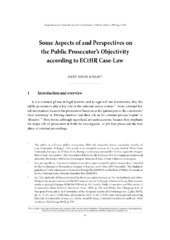| dc.contributor.author | Kjelby, Gert Johan | |
| dc.date.accessioned | 2019-09-24T08:53:58Z | |
| dc.date.available | 2019-09-24T08:53:58Z | |
| dc.date.issued | 2015-07-07 | |
| dc.Published | Kjelby GJ. Some Aspects of and Perspectives on the Public Prosecutor’s Objectivity according to ECtHR Case-Law. Bergen Journal of Criminal Law & Criminal Justice. 2015;3(1):61-83. | eng |
| dc.identifier.issn | 1894-4183 | |
| dc.identifier.uri | https://hdl.handle.net/1956/20875 | |
| dc.description.abstract | The principle of objectivity includes several aspects of the prosecutor’s functions. This article highlights some aspects of and perspectives on the prosecutor’s role and raises some central questions regarding the prosecutor’s obligation to objectivity according to the case-law of the ECtHR. The fundamental duty to act objectively is first of all crucial for the prosecutor’s role as the protector of human rights, because prosecutors’ objectivity and independence is an integrated element of the state’s human rights obligations (the positive obligation to conduct an “effective official investigation” and right to an “effective” domestic remedy). ECtHR’s case-law has a strong focus on the objectivity of police and prosecutors, and the court has performed a thorough examination of several aspects of this obligation. The prosecutor’s duty to act objectively is further elaborated in connection with aspects of the law on evidence, especially regarding the collection of evidence, the evaluation of evidence, evidentiary standards, and the prosecution's burden of proof. The author suggests some legal strategies to secure and uphold a strict principle of objectivity. Finally the article also raises the question whether prosecutors’ involvement in plea agreements a threat to the principle of objectivity. Such procedures are not in itself incompatible with the fair-trial standard in article 6, but the concept of plea-bargaining and plea-agreements is a complex and disputed one. ECtHR has in some cases found such agreements incompatible with the obligation to conduct an effective investigation. The author argues that the overarching principle should be that any simplified criminal procedure must give sufficient guarantees to secure the overall fairness of the process and its outcome. To lean on the prosecutor’s duty to objectivity and independency in this respect is hardly enough. | en_US |
| dc.language.iso | eng | eng |
| dc.publisher | The Faculty of Law, University of Bergen. | eng |
| dc.rights | Attribution CC BY 3.0 | eng |
| dc.rights.uri | https://creativecommons.org/licenses/by/3.0/ | eng |
| dc.title | Some Aspects of and Perspectives on the Public Prosecutor’s Objectivity according to ECtHR Case-Law | eng |
| dc.type | Journal article | |
| dc.type | Peer reviewed | |
| dc.date.updated | 2019-07-16T14:06:08Z | |
| dc.description.version | publishedVersion | |
| dc.rights.holder | Copyright 2015 Gert Johan Kjelby | eng |
| dc.identifier.doi | https://doi.org/10.15845/bjclcj.v3i1.828 | |
| dc.identifier.cristin | 1254625 | |
| dc.source.journal | Bergen Journal of Criminal Law & Criminal Justice | |

